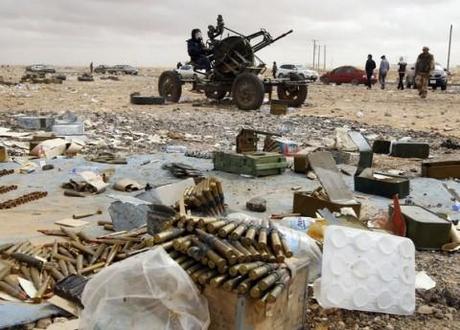
A rebel mans an anti-aircraft gun in Ras Lanuf, Libya, March 8, 2011. Photo credit: شبكة برق | B.R.Q
The US has officially recognised the Libyan rebel leadership as the country’s “legitimate governing authority”. The decision, announced by Hillary Clinton after a meeting of the Libya Contact Group in Turkey, should allow the Libyan Transitional National Council (TNC) access to the nation’s billion-dollar assets that have been frozen by foreign powers. But as the five-month anniversary of the Libyan rebellion looms, the US decision to recognise the TNC as the country’s sole governing authority has drawn criticism from several sides.
“Those who declare recognition stand fully on the side of one political force in a civil war.”
- Russia accuses US of taking sides. Russian Foreign Minister Sergei Lavrov criticised the recognition of the TNC as the sole legitimate authority in Libya: “Those who declare recognition stand fully on the side of one political force in a civil war,” he said. Russia did not attend the Contact Group meeting. Lavrov claimed Russia would take a more balanced stance: “If it comes to the recognition of the TNC and other opposition groups as a side in the talks, then unconditionally the TNC is such a side. However, if it refers to the recognition of the TNC as the sole legitimate representative of the Russian people, as the so-called Contact Group stated in Istanbul, we don’t share that position,” Lavrov said, according to the Xinhua News Agency. This is not the first time that the NATO response to Libya has drawn criticism from Russia: the country’s representatives declined to vote on the UN resolution for military intervention to protect civilians, and Russian ministers have criticised the scope of the military campaign. However, Lavrov also insisted Russia would not offer asylum to Muammar Gaddafi, if he left power.
- Zuma joins the fray. South African President Jacob Zuma added his voice to criticism of Western dealings in Libya. During a joint press conference with UK Prime Minister David Cameron, Zuma told reporters he believed the Libyan people should be masters of their own destiny. By contrast, Cameron insisted their difference in approach were not serious: “We both want to see a future for Libya that does not include Colonel Gaddafi. The difference is that the President sees that as the outcome of a political process.”
Did you catch that sleight of command?
- Abdicating responsibility. Writing on the Time blog, Mark Thompson suggested that the US decision to recognise the TNC was linked to President Obama’s refusal to become embroiled in another foreign conflict just as the withdrawal of US troops from Afghanistan gets underway: “Did you catch that sleight-of-command over the weekend?… The recognition lets the anti-Gaddafi forces tap into the $30 billion in Libyan government funds held in US banks. So it makes for a perfect war, as far as the Obama Administration is concerned: we’re neither leading it nor paying for it.”
- Not everyone’s a critic. The TNC described the US as “the protector and promoter of democracy and freedom across the world.” Writing on the Foreign Policy blog, James Traub said the decision to recognise the TNC was correct, and calls it “an important step forward”. However, Traub also pointed out that this alone would not be enough to turn the tide in the five-month war: “Success will require patience and persistence from NATO, creativity from the United States, and pragmatism from the rebels. And there is good reason right now to worry about each of those things.”
More on Libya
- France may be in contact with Gaddafi
- ICC issues arrest warrant for Gaddafi
- Gaddafi ordered Viagra to help troops commit mass rape
- Nato air strikes kill Libyan civilians

